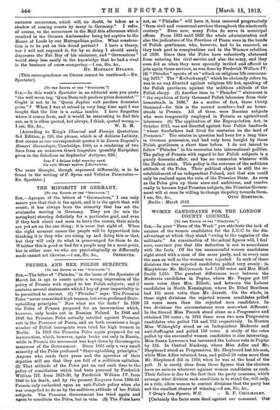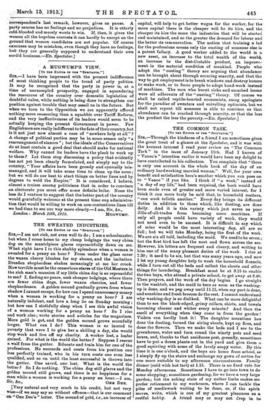WOMEN CANDIDATES FOR THE LONDON COUNTY COUNCIL.
[To THE EDITOR OP THE " SPECTATOR."] Sin,—In your "News of the Week" you attribute the lack of success of the women candidates for the L.C.C. to the dis- advantage at which they stand " owing to the vagaries of the militants." An examination of the actual figures will, I feel sure, convince you that this deduction is not in accordance with the facts. Of the ten unsuccessful women candidates eight stood with a man of the same party, and in every case the man as well as the woman was rejected. In each of these divisions the two rejected candidates polled very evenly : in Marylebone Mr. McCormack had 1,056 votes and Mrs. Miall Smith 1,055. The greatest differences were between the Moderate candidates in Poplar, where Mr. Vosper got 107 more votes than Mrs. Elliott; and between the Labour candidates in North Kensington, where Dr. Ethel Bentham had 101 more votes than Mr. Jarrett. On the whole, in these eight divisions the rejected women candidates polled 13 votes more than the rejected men candidates. In two divisions the circumstances were somewhat different. In the Strand Miss Pocock stood alone as a Progressive and obtained 793 votes ; in 1910 there were two men Progressive candidates who polled 758 and 752 respectively. In Hoxton Miss Willoughby stood as an Independent Moderate and anti-Suffragist and polled 158 votes. A study of the votes polled by the successful women candidates is also interesting. Miss Susan Lawrence has increased the Labour vote in Poplar by 125. In Central Hackney, where Miss Adler and Mr. Shepheard stood as Progressives, Mr. Shepheard lost his seat, while Miss Adler retained hers, and polled 20 votes more than Mr. Shepheard did in 1910, when he was at the head of the poll. It is surely clear from these figures that the electors have no animus whatever against women candidates as such. Their failure is due to the fact that the party caucuses, which arrange what division each candidate is to stand for, will only, as a rule, allow women to contest divisions that the party has not the smallest chance of winning.—I am, Sir, &c., 7 Gray's Inn Square, W.C. F R. F. CHOLMELEY. [Certainly the facts seem dead against our comment. Our correspondent's last remark, however, gives us pause. A party caucus has no feelings and no prejudices. It is utterly cold-blooded and merely wants to win. If, then, it gives the women all the hopeless contests it can hardly be except on the ground that women candidates are not popular. Of course caucuses may be mistaken, even though they have no feelings, but. they are generally supposed to understand their own sordid business.—En. Spectator.]















































 Previous page
Previous page